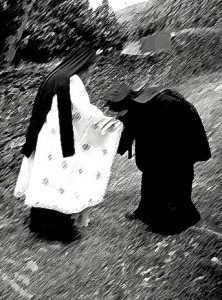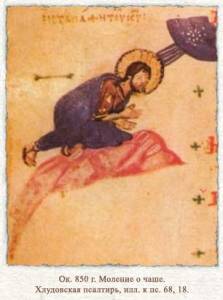FATHER GAVRIL GALEV: ON OBEDIENCE
There were four monks who lived in a skete, dressed in animal skins they visited the Great Pambo. They talked about the good deeds of their brothers. The first one used to fast a lot, the second one lived in great poverty, the third one had a lot of love, and the fourth one was twenty years in obedience to his Elder. Pambo answered to them: “I say to you that the virtue of the last one is the greatest one. Since all the rest of you achieved what you wanted through your own will, and the last one cut off his will, did everything according to the will of another one. Such people become confessors, if they endure to the end.”
Similarly Abba Moses advises us to strive to achieve obedience. Obedience is: ‘the perfect renunciation of our soul proven with physical deeds and deeds without reasonableness’ as Abba John Kolov said, when his Elder took his dry cane and stuck it in the dry sand instructing him: “Water this wood every day with a glass of water until it bears fruit.” Abba John would go to the nearest spring every day, rising early in the morning and coming back at night, watering the stick. And it truly bore fruit after three years, “the fruit of obedience.”
“A tomb of our own will and the resurrection of humbleness” is illustrated through the following example by Abba Sisoi. Abba Atr’s obedience was great. Abba Sisoi said: “Where did you find such great obedience?” Abba Atr humbly answered him: “It (the obedience) is not mine but my Elder’s (Or’s).” He further demonstrated his obedience towards his Elder, when he took two fish, he ruined the first one, and fried the second one very well, and he gave the first one to him first, saying:
“Is it good Father?”
“It is good, very good,” he said.
Then he gave him the good one and told him:
“I ruined this one, Father!
“Yes, you ruined it a bit”, said the Elder.
“Not contradicting others and not reasoning what is good and what is seemingly bad, when doing so the responsibility falls on the spiritual father”. Abba Joseph said to one of the brothers to eat on a Friday morning. Since Friday was a fast day the brother was greatly confused and did not know what to do. Then Abba Joseph told him that at the beginning the Fathers were ordering the novices to do the wrong things, they observed the monks who would do as they were told regardless whether it was wrong. As a consequence they knew which monks were the obedient ones. In the same manner Abba Muis, in order to tempt his novice Abba Sai, ordered him to go and steal. Obeying his Elder, Abba Sai in obedience went and stole from his brothers, thanking God for everything. Then the Elder was returning the stolen objects to prevent tempting the brothers.
“Refrain from judging even in abundance of reasonableness,” it was said of Abba Zachary who had a vision from God. He told his Elder and biological father, Abba Koronij, who was of practical mind and not so thorough. His Elder dismissed the vision saying that it came from the demon. Abba Zachary went to Abba Pimen and told him about the vision. The latter informed him: “The vision was from God, however you should now go and obey your father.”
Obedience is also “a voluntary death, a life which doesn’t know curiosity; it is endless modesty, unprepared excuse in front of God, fearless death, travelling in a dream, repelling hypocrisy and our own will.”
 A novice is the one who with his body stands in front of people yet with his mind beats the heavens through prayer, or as John Climacus put it poetically: “Prepared with one leg to serve, and with the other one to pray immovably.”
A novice is the one who with his body stands in front of people yet with his mind beats the heavens through prayer, or as John Climacus put it poetically: “Prepared with one leg to serve, and with the other one to pray immovably.”
The demon strives to physically desecrate the novice, making him unbending, rejecting obedience, excessively restless, cold, fruitless, lazy for prayer, sleepy and morose. The novice starts thinking that there is no use in observing obedience, and starts thinking to give it up, even to give up the whole exploit.
The demon doesn’t allow the novice to understand that the pondered taking away of what seems good to us becomes the reason for the deepest humility. As for those who achieved some perfection under the guidance of an Elder, the demon suggests to their minds that they are already spiritually mature and able to practice speechlessness, or to go back to the world as ‘saviours’. Pride and not confessing the sins, even those thoughts that seem unimportant, can be a great danger for the novice, and the biggest of all previously mentioned is called willfulness.
At the first level of spiritual growth, the novice endures a great grief, self-violence and a very difficult self-forcing. The first sign of healing is self-condemnation and realising one’s own weakness and helplessness.
At the second level, the novice doesn’t feel grief any more and reaches a higher degree; because of the effort made there is a prize from God in store for him. He descends with his mind into the hell of humility, considering himself dispensable and unworthy of all and of everything, especially God.
To reach the goal, one needs constancy in the exploit and an obligatory, perfect and imprudent obedience to an experienced Elder, chosen according to the characteristics of one’s own passions. A good example of everything said earlier can be found in the life of Abba John Kolov, who received the providence to lead an untroubled angelic life and praise God in that way. He accepted the thought and went to the desert alone. Then he become aware of his error, and after a week he came back, he chose a spiritual father and devoted himself to the obedience according to the rules that Abba John Climacus stated: simplicity, patience, goodness, calm enduring of insults, reprimands and scorning, any type of dishonouring, even beating from the spiritual father, the close ones or the enemy, and on the other hand being ashamed from oneself, all these things are bitter for the soul of the novice, but purify it from the passions. Leading a healthy monastic life in obedience, moderation, watching over the heart, self-humiliation, restraining the mind and the body, silence, indifference towards the outside world, gentle tongue, innocence, reminder of death, putting the conscience as the mirror of obedience, all these efforts of the novice make his conscience pure and calm and far from any fear, even the fear of death.
Filled with joy and love, he is presented by God with the gifts which He has prepared for those following this way: humbleness, reasonableness out of humility, good recognition out of reasonableness, finally achieving clear-sightedness and the perfect state of being passionless.
Father Gavril Galev
( Extract from the book: THE VIRTUES IN THE LADDER OF SAINT JOHN CLIMACUS AND IN THE SAYINGS OF THE DESERT FATHERS )

